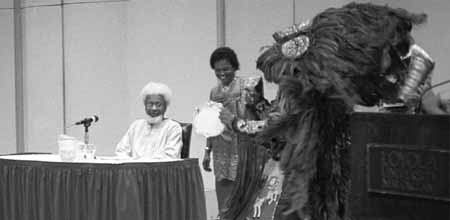Nobel Prize winner and Nigerian native Wole Soyinka cited tolerance as the prime virtue of Yoruba, the native Nigerian religion on which his literary works are often focused.
“Never in human history has the world required such a virtue for its very survival,” he said.
In his lecture on Wednesday night, Soyinka focused on the relationship between the Yoruba religion and the modern world. In particular, he discussed the role of the “world religions” of Christianity and Islam and how they regarded Yoruba, which is a polytheistic religion.
“Yoruba rejects the notion that monotheism reflects a higher stage in cultural development,” he said.
Soyinka, whose play “Camwood on the Leaves” made its American premiere at Loyola Wednesday night, became the first African to be awarded the Nobel Prize in literature in 1986, lecture coordinator and English professor Phanuel Egejuru said.
“As far as the black world is concerned,…he is very significant,” she said. “He made the way for others.”
Egejuru, who has been planning for this event since 1998, said that she asked Soyinka to come to Loyola because it was important for an American audience to know that there is such a thing as an African Nobel Prize winner.
“They need to know that there is something, a culture, over there,” she said.
Niyi Osundare, who introduced Soyinka, agreed with Egejuru in regard to Soyinka’s writing merits.
In his introduction, Osundare said that Soyinka was not only “one of the best African writers today,” but that he was one of the best writers of all time.
Egejuru said that Soyinka’s focus on African oral tradition in his writings is empowering for African from all countries. She said that Soyinka’s writings help others to acknowledge their African heritage.
“You want to impress upon the world that you are black and proud,” Egejuru said. “You need to show that there is a culture, whether that culture is in the continent or the Diaspora.”
Communications sophomore Melissa Simpson said that she enjoyed Soyinka’s narrative about Yoruba deities. She said that his humorous approach to the stories of the gods made the lecture amusing.
However, Simpson said her favorite part of the lecture was when Soyinka spoke about tolerance as a virtue that everyone would benefit from in today’s world.
“That was awesome,” she said. “We have wars, because there is not enough tolerance in the world. People should recognize that.”
Also at the lecture was Roxy Wright, the executive assistant to Lt. Gov. Kathleen Blanco. She presented Soyinka with a certificate from the state of Louisiana that made him an honorary citizen of Louisiana.
Wright also gave Soyinka a certificate of appreciation for his artistic contributions to New Orleans, signed by mayor Ray Nagin.
“Camwood on the Leaves” was directed through the Loyola drama department. Because it was originally a radio play, the students had the chance to experiment in self-direction when they worked individually to place action with their characters’ dialogue.
Communications senior Jason George said that this experience was unique.
“It was intense. There was a lot of pressure, because it was the premiere,” he said. “It was a great opportunity, though. You don’t really have too many chances to be in the [American] premiere of a play.”
University provost Walter Harris, who spoke at the lecture, commended the student actors and technicians on an “exceedingly fine job.”

Wole Soyinka addresses the audience who gathered after his play Wednesday. (Pamela Howard)







